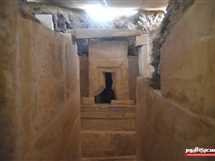The discovery of the tomb of Hattab the priest of the goddess H
of the ancient Egyptian family in the pyramids
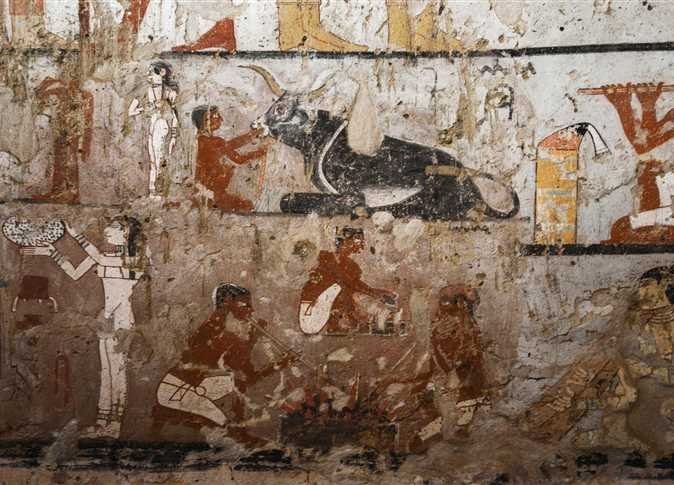
The Egyptian Minister of Antiquities, Dr. Khaled Al-Anani, announced on Saturday the discovery of a cemetery that is likely to be a woman named Hattab from the Old Kingdom, which dates back to the fifth Dynasty, four hundred and four hundred years ago, a "priest of the goddess Hathor."
This came during a press conference held by the Minister in the area of the ruins of the pyramid to announce the details of the new archaeological discovery in the Western Al-Jubbana area west of the Great Pyramid (Khufu), in the presence of Giza Governor Mohammed Kamal Al-Dali, a number of foreign ambassadors and officials of the Ministry of Antiquities. the event.
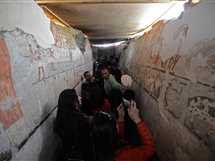
This is a continuation of the series of new archaeological discoveries announced by the Ministry of Antiquities constantly throughout the Republic.
The minister pointed out that the Egyptian mission, headed by Dr. Mustafa Waziri, Secretary General of the Supreme Council of Antiquities, succeeded in discovering the cemetery, which found the possessions of this lady more than 109 years ago and is currently in the Berlin Museum, pointing out that the excavations in that area began since October Past and continue to work.
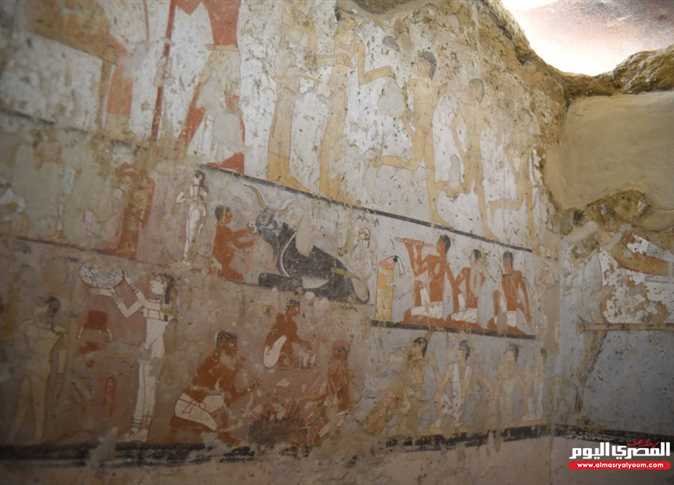
He explained that this disclosure is the first in 2018 is scheduled in the coming weeks to announce an important archaeological discovery.
For his part, Mustafa Waziri said that the cemetery of the priest of Hattab probably is not the core cemetery of the priest, it is made of bricks brick mortar layer but the core cemetery, which was found in the old possessions likely to be in the same area and be completely stone.
He added that the cemetery has unique views, including the domesticated monkey who danced before a band and other inscriptions.
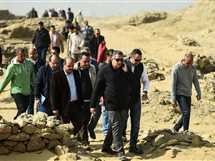
The Secretary-General of the Supreme Council of Antiquities said that the tomb of Mrs. Hetbt, which was announced today is searched since 1905, and carries all the features of the Fifth Dynasty in terms of architectural planning and technical elements .. He pointed out that the last work in the area of archaeological detection was Dr. Zahi Hawass Stressing that the cemetery.
In a statement to Middle East News Agency, Waziri said that it consists of an entrance leading to a L-shaped cabin with a desecration basin that bore the names of the cemetery owner and the priestess and one of the senior officials associated with the royal tiles.
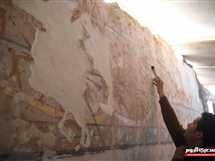
He added that at the end of the corridor of the cabin from the west, there is an entrance with a staircase lined with a holder of incense and offerings leading to a small room with a naos, which had a statue of the cemetery was not found so far and the floor of the cabin there is a small table for offerings.
He explained that the walls of the cemetery were decorated with colorful scenes depicting Hetbet in the stand position, showing the scenes of hunting birds and fish, as well as waiting for various industries such as papyrus, leather, smelting, grazing, slaughtering the sacrifices, gathering fruit, musical bands and dancing girls, as the graveyard shows in other scenes, She receives offerings from her children.
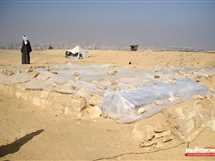
He added that there are also on the walls of the cemetery views of two peoples, which confirms that the monkeys were consecrated at the time depicts the first scene monkey fruit collecting the other scene in the picture of one of the monkeys dancing with a whole band is a distinctive view and there is similar to the tomb of Ka across the area of the effects of Saqqara family era The fifth shows the monkey with a single guitarist and not with a whole orchestra.

He explained that the new cemetery was numbered (g9000) to maintain the digitization of graves in the cemetery.
Dr. Khaled al-Anani, Minister of Antiquities, announced the discovery of the tomb of a woman named Hattab, who was one of the senior officials of the royal palace during the end of the fifth Dynasty of the ancient state. Supreme Council of Antiquities.
The Western cemetery includes tombs of senior officials from the ancient state, who were found by archaeological missions that have been working in the cemetery since 1842.
